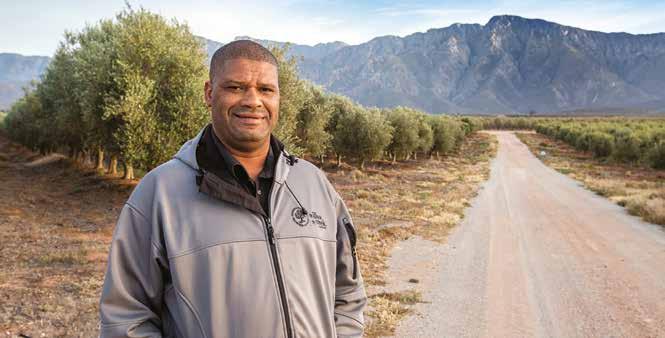
3 minute read
THE FUTURE IS HERE
by WCDOA pubs
by Dr Dirk Troskie, dirkt@elsenburg.com
H‘Have your chicken and eat it’. ‘Use 99,9% less herbicides’. ‘No diesel bill’. ‘No human footprint in your fields’. Surely, these statements are the science fiction of overeager writers without a proper understanding of the realities of farming? Wrong; they are real prototype developments. Some may have heard of “clean meat” (meat/chicken grown in a laboratory), light-weight solarpowered farm equipment moving in swarms or the Hands Free Hectare at Harper Adams University.
How should the Western Cape agricultural sector respond to these developments? After all, in order to remain competitive, the sector needs to embrace appropriate developments while minimising negative consequences. This challenge was raised in the Elsenburg Journal in 2017 (Troskie 2017). The Western Cape Department of Agriculture (WCDoA) has subsequently contracted the Business School of Stellenbosch University to conduct a “diagnostic, impact and design evaluation” of the Fourth Industrial Revolution (4th IR) in relation to the local agricultural sector (see WCDoA/USB, 2017).
The first section of this report provided the necessary context with the emphasis on, among other things, the 4th IR, local farming
(e.g. realities including unemployment, resources, and policy priorities), drivers underpinning the 4th IR and potential future scenarios (Figure 1). It is important to note that demographic and socioeconomic drivers are just as important as technological changes. The second part focussed on technologies influencing the sector and 27 different technologies (see working documents on elsenburg.com), were described and contextualised (Figure 2). In the final section, five enablers (Figure 3) to be supported by 26 actions were identified and documented. It is important to note that these actions are not “government must” recommendations, but allocate responsibilities to government, academia, scientists, producers, processors, consumers, agribusiness, suppliers, advisors, industry associations, investors and retailers. Hence, if the Western Cape agricultural sector wants to achieve the “desired end state” or embrace the 4th IR to the benefit of all, every section of the agricultural community has a role to play.

As intervention by the WCDoA is implied by 17 of the actions, the department developed a management improvement plan (MIP) in response. These actions were clustered into four improvement objectives and for each a number of activities, deliverables, (one) responsible person, due date, and budget allocation were identified. The improvement objectives are: a) Embed agri-renaissance in the Western Cape as the desired end state of the 4th IR. b) Accelerate responsible technology adoption in the Western Cape agricultural sector. c) Develop young people to embrace the 4th IR in support of agricultural development. d) Reorient perceptions of agriculture in the context of the 4th IR.
The 4th IR is included in the department’s strategic planning and actions (see MIP, and actions such as CapeFarmMapper, Fruitlook, the “flyover” project, smart pen and tractor tracker).

The WCDoA is forming a number of partnerships to accelerate responsible technology adoption. With ABSA and the Institute of Futures Research, a technology scanning process will be conducted to identify and evaluate technology developments and their impacts. The department has partnered with the Co-lab at the University of the Western Cape (UWC) to develop and present a training module on e-commerce for emerging farmers and to empower agri workers by providing e-literacy training, among other things. A third partnership is with the United Nations Development Programme (UNDP), Endangered Wildlife Trust (EWT) and the Global Environmental Facility (GEF) to host a Conservation and Agriculture Drone Users Conference at Elsenburg during November 2019.
Because young people are the future of any society, it is important to equip them with the necessary skills to face the future. Hence, the WCDoA has contracted Drone-X to hold a drone awareness day at the Elsenburg College, present two 2-day drone workshops (one at Elsenburg; the other in George) and to support at least 10 students to obtain their remote pilot licenses (RPL). These students will have agricultural qualifications and be trained drone pilots – a sought-after combination. With the staff and students of the postgraduate diploma in immersive technologies at UWC, a number of augmented/virtual reality applications for agriculture are being developed.
Over the next couple of decades, the shape of agriculture will change irrevocably and we can either allow change to happen
References
to us or we ourselves can shape the future our children will inherit. However, shaping the agricultural future of the Western Cape is not a task for the WCDoA alone, but needs to be a concerted effort by the agricultural community of the Western Cape. The WCDoA has paved the way by commissioning and publishing the 4th IR evaluation report and by developing and implementing its own response plan. What are the response plans of the rest of the agricultural community? Please internalise our information and share your response plans. We will continue to update our actions via AgriProbe – keep reading. AP elsenburg.com/content/4th-industrialrevolution-evaluation-report
Troskie, D.P. 2017. The 4th Industrial revolution: Understanding its impact on the Western Cape’s agricultural sector. Elsenburg Journal, 14(1):53–57.
WCDoA/USB. 2017. The future of the Western Cape Agricultural Sector in the context of the Fourth Industrial Revolution. Report commissioned by the WCDoA and compiled by the Business School at Stellenbosch University.











